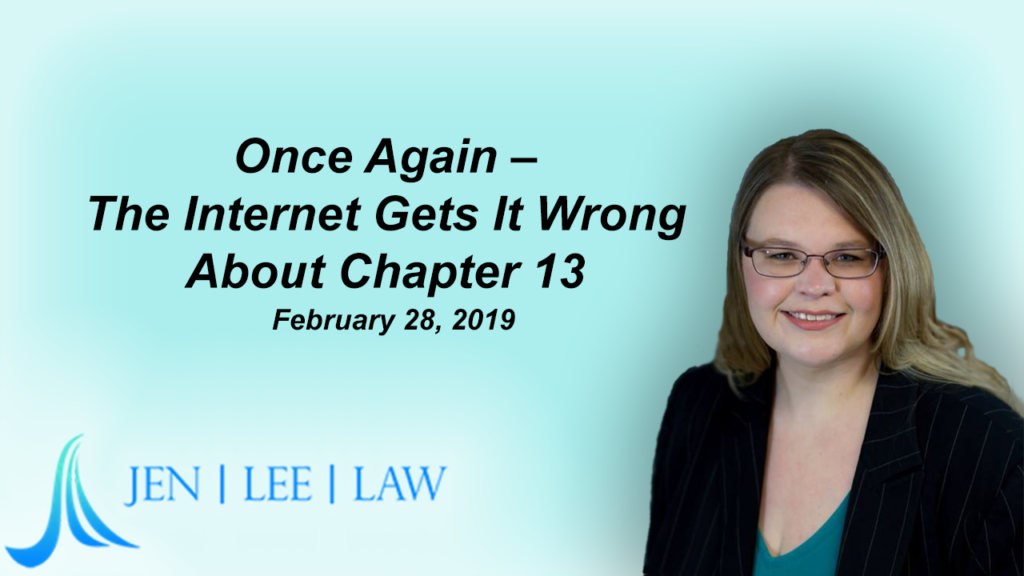
Two new articles this week, one on The Street called What is Chapter 13 Bankruptcy and Is It Worth It? and the other on Lending Tree titled, Chapter 11 vs. Chapter 7 Bankruptcy: What to Know. I reluctantly read both, hoping they would get it right…and lots of eye-rolling took place instead.
Here’s where the first one went wrong – I don’t even have enough room in this blog to outline where the second one went wrong (but I will try to for next week):
- “Chapter 13 bankruptcy is one of the types geared toward individuals and families as opposed to businesses.”
Wrong. Only individuals qualify for Chapter 13. If you are a sole proprietor, you are an individual. I file many, many bankruptcies for business owners because they are sole proprietors. Chapter 13 is very powerful for business owners. - “The Chapter 13 method of restructuring debts and creating monthly payments over a set period of time is similar to Chapter 11 bankruptcy, with the crucial difference being that Chapter 11 is for businesses.”
Wrong. Individuals can file both Chapter 13 and Chapter 11. There are different reasons and situations where these options can be appropriate. - “The most important difference between the two is that Chapter 7 bankruptcy allows for the possibility of liquidating assets to help pay off debts. Chapter 13 does not liquidate assets.”
Wrong. Chapter 7 bankruptcy REQUIRES the liquidation of non-exempt assets. That’s the trustee’s job in a Chapter 7. Chapter 13 can liquidate assets, if you choose to. The most important difference between the two is who has the ability to liquidate the assets and the purpose for filing . - “Once you’ve taken credit counseling classes you can submit a petition to file for bankruptcy. If that petition is successful, your case is given to a trustee who will oversee a case.”
Ok, you don’t “submit a petition to file for bankruptcy.” You file your bankruptcy petition and an online credit counseling course is required before you actually file the petition. There is nothing in the bankruptcy code about your petition being successful and then being “given to a trustee” who will oversee a case. In both Chapter 7 and Chapter 13, you file a petition and a trustee is assigned from the very beginning. Success has nothing to do with it. - “They will also set up a meeting in which you will have to testify under oath about your debt.”
There is a meeting of creditors where the trustee asks you questions about your petition, including whether you listed all of your assets and all of your liabilities. There is NOT a meeting where you get interrogated about the types of debts you have and why you had to file bankruptcy. This is one of the biggest fears and misconceptions out there. - “Throughout the duration of your plan, you are also not allowed to incur any further debts.”
Wrong. In fact, I have several clients who bought new houses with mortgages while in a Chapter 13. You are required to get court or trustee approval for taking on new debt, but it’s totally possible to buy a new car (or reliable used car) or a house while in Chapter 13. - “One particularly prominent detriment to Chapter 13 (any bankruptcy, really) is that it demolishes your credit score for a while, even if you make all your payments on time.”
Ok, this is the most ridiculous point in the whole article. Most of my clients that actually start rebuilding their credit during their payment plan have 650 (or higher – one came in recently with a 756) credit scores. If you make all of your payments on time for 12 months in a Chapter 13, you qualify for an FHA mortgage. By the time someone gets to bankruptcy, your credit score often goes UP when you file bankruptcy because finances have been stressed for quite some time before you get to that point. - “Chapter 13 may not be the most last resort bankruptcy option, but it’s close.”
Chapter 13 is one of the most powerful debt tools available. I’ve saved houses, marriages, families, and businesses over the past 10 years using this powerful tool. I’m sitting in a meeting right now with a client who says that Chapter 13 was the best thing she ever did for her family and business.
Please find out your rights and options before making a decision. Relying on Google searches may lead you down a path where you are making decisions on bad information.
Here are links to the two articles I read:
https://www.thestreet.com/personal-finance/debt-management/what-is-chapter-13-bankruptcy-14867012
https://www.lendingtree.com/bankruptcy/chapter-11-vs-chapter-7-bankruptcy/
This is just a basic overview and is not legal advice specific to your situation. If you have questions about your rights when it comes to debt and credit, you should speak with an attorney in your area for legal advice. If you live in California or North Dakota and would like to speak with Jen Lee Law regarding your situation, please schedule an appointment.



